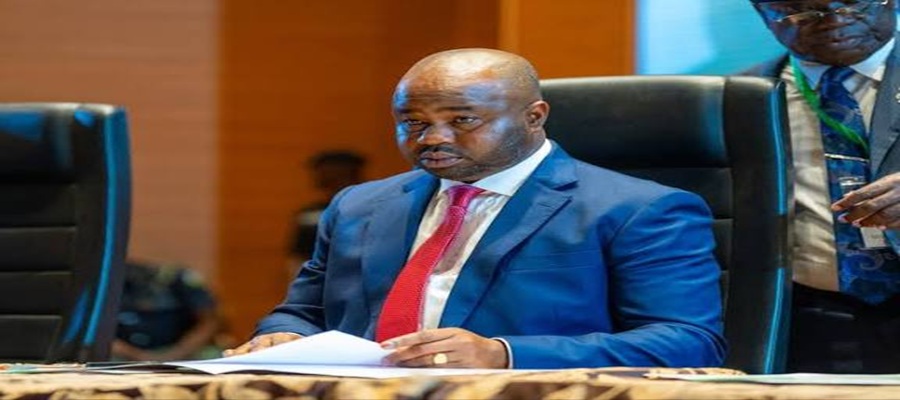News
IFC, DFID Partner to Improve Access to Electricity for More SMEs in Nigeria

IFC, a member of the World Bank Group and United Kingdom’s Department for International Development (DFID), have partnered to facilitate the deployment of off-grid and embedded solar systems in commercial and industrial sectors of Nigeria.
The ultimate goal is to help corporates and SMEs to have better and more reliable access to electricity, utilizing the country’s abundant solar resources, and thus contributing to Nigeria’s sustainable economic growth and greenhouse gas emission reduction objectives.
Through this partnership, IFC’s Off-Grid and Embedded Solar Market Development and Finance Program, and DFID’s Solar Nigeria Program are launching a new program in Nigeria for solar market development and finance. One of its major components will be to provide technical support and possibly financial instruments to local financial institutions.
This will help them develop business solutions for the emerging solar market especially solar PV technology investments in Nigeria. The program is being launched at a workshop that will share market study findings, present the key components of the program implementation phase, and collect feedback from stakeholders.
Ben Mellor, DFID Nigeria’s Head of Office, said, “The UK Government is committed to helping to increase investment in off-grid energy and accelerating the delivery of solar energy systems that will help improve access to energy for more businesses.
As access to energy is one of the most critical business needs in Africa and particularly Nigeria, the UK’s Department for International Development is determined to assist in bringing solar technology financing solutions to smaller businesses and corporates and we are working with IFC to help implement these solutions.”
“IFC has been at the fore, creating and facilitating solutions to help increase access to energy at the home and corporate levels in Nigeria,” said, Eme Essien Lore, IFC Country Manager for Nigeria.
“The Solar market has the potential for quick wins in bringing access to electricity for more businesses as it takes less time to install.
It also enables production of electricity at the point of need, which eliminates transmission losses to a great extent. We are working with DFID to accelerate access to electricity for more businesses and help contribute to economic growth in the country,” she continued.
This program is part of the World Bank Group’s Energy Business Plan for Nigeria where each World Bank Group institution (IFC, IBRD, and MIGA) leverage their competencies and products to provide solutions for projects that encourage the viability and contribute to the sustainability of the power sector.
Over the past three years, IFC has financed close to $3.5 billion in renewable energy projects worldwide, including biomass, geothermal, hydro, solar, and wind.
News
NRS Boss Dismisses Fears of Political Weaponisation in Tax Reforms

Dr. Zacch Adedeji, Chairman of the Nigeria Revenue Service (NRS), has allayed fears that the new tax reform framework could be weaponised by the Federal Government to target political opponents or individuals based on affiliation.

Dr. Zacch Adedeji
Adedeji, responding to concerns over potential selective enforcement or politically motivated tax scrutiny, insisted the reforms prioritise national interest, transparency, due process, and institutional accountability.
Addressing speculations on suppressing opposition voices ahead of elections, he said: “I think the question you will ask is that we need to commend the courage of Mr. President, that despite the fact that there is an election coming, he is courageous enough to continue on this path of statesmanship and not of politicians.”
The NRS boss explained that it would have been politically expedient to shelve the reforms during an election cycle, but President Bola Tinubu opted to strengthen the country’s fiscal foundation and economic governance.
He outlined that the agenda targets structural tax system weaknesses, enhances fairness, and fosters a simplified, predictable compliance environment to boost voluntary participation over coercion.
Adedeji attributed public scepticism to Nigeria’s history of perceived institutional misuse, but stressed the new framework minimises administrative discretion through rule-based processes, automation, accountability, and governance safeguards insulated from political influence.
According to him, the reforms emphasise taxpayer trust, linking taxes to visible public service improvements while expanding growth opportunities and sustainable public finances.
He reaffirmed the focus on economic stability, credible institutions, phased implementation, investment support, vulnerable group protection, and freedom from partisan interference.
News
Court Sends Faleti, Ex-Lagos Director to Jail for Stealing ₦48.9m from Access Bank

An Ikeja Special Offences and Domestic Violence Court on Monday sentenced Olawale Faleti, a former Lagos State Education director, to two years and five months’ imprisonment for stealing ₦48.9 million from Access Bank Plc.

Justice Rahman Oshodi convicted Faleti, 64, on five counts of stealing after finding him guilty of charges filed by the Economic and Financial Crimes Commission (EFCC).
In his judgment, Oshodi said the offence was deliberate and sustained, noting that Faleti carried out repeated withdrawals despite knowing he had no authorisation to access the funds.
The judge added that the convict failed to show genuine remorse or fully accept responsibility for his actions.
“Financial institutions are the lifeblood of our economy and public confidence in them must be preserved,” Oshodi said, adding that “Those who attempt to defraud or steal from banks must understand that severe consequences will follow.”
While acknowledging Faleti as a first-time offender, the court said a custodial sentence was unavoidable.
The judge applied a 20 per cent reduction from the three-year maximum sentence, citing minimal restitution efforts as a mitigating factor.
Faleti was sentenced to two years and five months’ imprisonment on each of the five counts, with the sentences ordered to run concurrently.
The court directed that the sentence take effect from January 5, 2026, and ordered that Faleti’s biometric details and name be entered into the Lagos State Judiciary offenders’ registry.
After deducting ₦3 million already restituted, the court ordered Faleti to pay an outstanding ₦45.9 million to Access Bank Plc, directing the bank to notify the court upon full recovery of the funds.
Earlier, Mr Ahmed Dambuwa, EFCC counsel, told the court that Faleti dishonestly converted ₦48.9 million belonging to the bank by exploiting unauthorised access to an Access Bank credit card.
He said the card permitted withdrawals of not less than ₦43,000 per transaction, but a system glitch enabled Faleti to withdraw about ₦48 million during the COVID-19 pandemic in 2020.
One of the charges stated that between July 2 and July 10, 2020, Faleti converted ₦12.6 million for personal use, while another alleged that between May 22 and July 1, 2020, he converted ₦6.9 million, all property of Access Bank Plc.
The offences were said to contravene Section 287(1)(a) of the Criminal Law of Lagos State, 2015.
News
974 Nigerians Face Imminent Deportation from Canada Amid Enforcement Surge

974 Nigerians Face Imminent Deportation from Canada Amid Enforcement Surge – No fewer than 974 Nigerians are currently facing imminent deportation from Canada, according to official data from the Canada Border Services Agency (CBSA).

The affected individuals fall under the country’s “removal-in-progress” category, signifying that deportation proceedings have commenced but remain inconclusive, pending final arrangements such as travel documents. Between January and October 2025 alone, Canadian authorities deported 366 Nigerians, marking a significant uptick from previous years.
Of these, approximately 83 per cent comprised failed refugee claimants, while criminality accounted for about four per cent of cases. Nigeria emerged as the only African country in Canada’s top 10 nationalities for deportations in 2025, securing ninth position, while ranking fifth among those awaiting removal.
This contrasts sharply with 2023 and 2024, when Nigeria was absent from the top 10 deportation list, though figures reflect an eight per cent rise over the 2019 total of 339 removals.
Canada’s aggressive enforcement drive has seen nearly 400 foreign nationals removed weekly, culminating in 18,048 deportations during the 2024-2025 fiscal year at a cost of about $78 million.
The initiative draws support from an additional $30.5 million for removals and $1.3 billion for border enforcement, aimed at bolstering immigration controls amid pressures on housing, employment, and security.
Canada remains a prime destination for Nigerians outside the United Kingdom and United States, with over 71,000 acquiring citizenship between 2005 and 2024, alongside thousands arriving annually as students, workers, and permanent residents.
Under Canadian law, those issued enforceable removal orders must depart voluntarily or face enforced exit. The CBSA’s nationwide inventory lists 29,542 individuals in removal-in-progress as of late 2025, dominated by failed refugee claims at 15,605 cases. Nigeria’s 974 cases place it behind India (6,515), Mexico (4,650), USA (1,704), and China (1,430).
Immigration lawyers caution that passage of Bill C-12 could escalate deportations by imposing permanent bans on certain refugee claims and curbing late filings.
Authorities attribute the push to restoring system integrity, with non-compliance by refugee claimants driving most inadmissibility findings.

 News1 day ago
News1 day agoCourt Sends Faleti, Ex-Lagos Director to Jail for Stealing ₦48.9m from Access Bank

 E-Financial1 day ago
E-Financial1 day agoRemita Powers over ₦100 Trillion in Payments as Nigeria’s Digital Economy Expands

 News2 days ago
News2 days ago974 Nigerians Face Imminent Deportation from Canada Amid Enforcement Surge

 General News2 days ago
General News2 days agoHouse of Reps Releases Certified Copies of Tax Reform Acts amid Gazette Discrepancy Claims

 E-Financial1 day ago
E-Financial1 day agoWhy 2026 Must Be the Year Nigeria’s Economy Works for All

 E-Financial1 day ago
E-Financial1 day agoFlutterwave Acquires Nigeria’s Mono in $25m-$40m All-Stock Deal

 General News1 day ago
General News1 day agoNigeria Targets Satellite-to-Mobile Services in Draft Spectrum Roadmap

 E-Financial1 day ago
E-Financial1 day ago2026: SEC to Review Rules to Incentivise SME Listings













